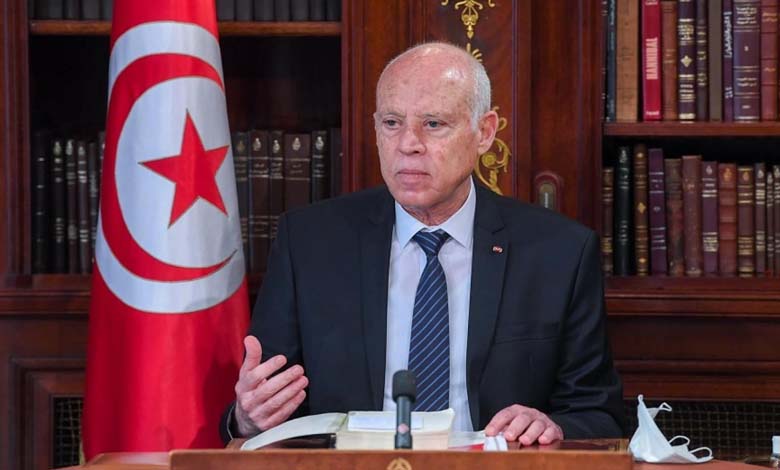Foreign Funding Under Scrutiny: President Kais Saied Reopens the Case of the Tunisian General Labour Union

The Tunisian presidency is moving rapidly to reinforce the principle of “accountability without exceptions,” now placing the Tunisian General Labour Union (UGTT) under the spotlight — an organization long considered a “red line” due to its size and historical influence.
-
Kais Saied escalates against the Muslim Brotherhood: Accountability is coming, and no one is above the law
-
On the Eve of the Verdict… Documents Reveal Tunisian Brotherhood’s Plot to Assassinate Kais Saied
As investigations expand into suspicious foreign funding received by several associations, expectations are rising that the country’s largest labor organization may be the next to undergo financial and structural scrutiny aimed at restoring transparency and discipline.
On Tuesday evening, President Kais Saied declared that “all public institutions must serve the citizens, and those who abuse or exploit them in any way cannot go unpunished. Those who have corrupted and destroyed will not remain outside the reach of justice. The Tunisian people’s money must be returned in full, down to the last millime, as it is their legitimate right.”
In response, the UGTT issued a statement on Wednesday asserting that it “is not above the law and does not reject accountability if wrongdoing is proven,” but firmly rejected “the practice of leveling baseless accusations without evidence.”
-
Pursuit of the Muslim Brotherhood: Kaïs Saïed pushes for resolution of cases
-
How Kais Saied Ended the Control of the “Muslim Brotherhood” Over Tunisia and Its Institutions: A Report Explains
Earlier in the week, Tunisian authorities suspended the activities of several associations for one month as part of ongoing investigations into suspicious foreign funding.
Among the targeted organizations are the Association of Democratic Women, the Tunisian Forum for Economic and Social Rights, the Manamti Association, and the Solidarity Association.
Last week, the Public Prosecution opened an inquiry into dozens of associations suspected of receiving illicit foreign funds.
-
Tunisia Ends the Era of the Muslim Brotherhood: Kais Saied Wins Presidential Election in the First Round
-
Kais Saied Exposes the Muslim Brotherhood’s Plots: A “Fierce War” Orchestrated from Abroad
The Attorney General’s office received reports from the Financial Analysis Committee of the Central Bank and the Court of Auditors indicating the inflow of substantial sums to certain associations.
These measures form part of a broader campaign to reorganize the non-governmental sector and verify the transparency of its funding sources.
Political analyst Abdelkrim Mahmoudi stated that “the government has begun a financial audit of the Union and reopened corruption cases involving some of its leaders, with the aim of taking legal action.”
-
Kais Saied Hints at His Candidacy for a Second Presidential Term
-
Kais Saied Opens Corruption File in Tunisair
He added that President Kais Saied views the UGTT as “an extension of the deep state” that he seeks to dismantle, recalling the president’s previous remarks about “corruption within the Union” and his emphasis on accountability for all.
According to Mahmoudi, “suspicions that some union leaders received foreign funding have turned the organization into an instrument of external interests, eroding public trust.”
President Saied also blames the Union for part of Tunisia’s economic crisis, citing the proliferation of strikes — nearly 30,000 in recent years — which have severely disrupted the national economy.
-
Kaïs Saïed sends new messages to the Muslim Brotherhood organization… What did he say?
-
Kais Saied reveals corruption of the Muslim Brotherhood in financial and banking institutions… Details
On October 7, during a meeting with Central Bank Governor Fathi Zouhair Nouri, the president denounced “vast amounts of money sent from abroad under the cover of darkness,” adding that some of it was used “in illegal activities such as smuggling and money laundering, benefiting individuals or entities, banking or otherwise, without sufficient oversight.”
Two days later, on October 9, Tunisian security forces arrested Lassâd Yacoubi, a prominent labor leader and former Secretary-General of the Secondary Education Union, on charges of hoarding and market manipulation.
Tunisia thus appears to be entering a new phase of institutional restructuring and civic reform, where even historically untouchable entities like the UGTT are no longer immune from comprehensive audits and accountability in the name of transparency and national integrity.












